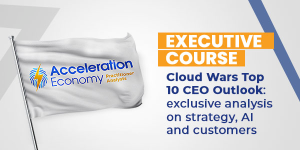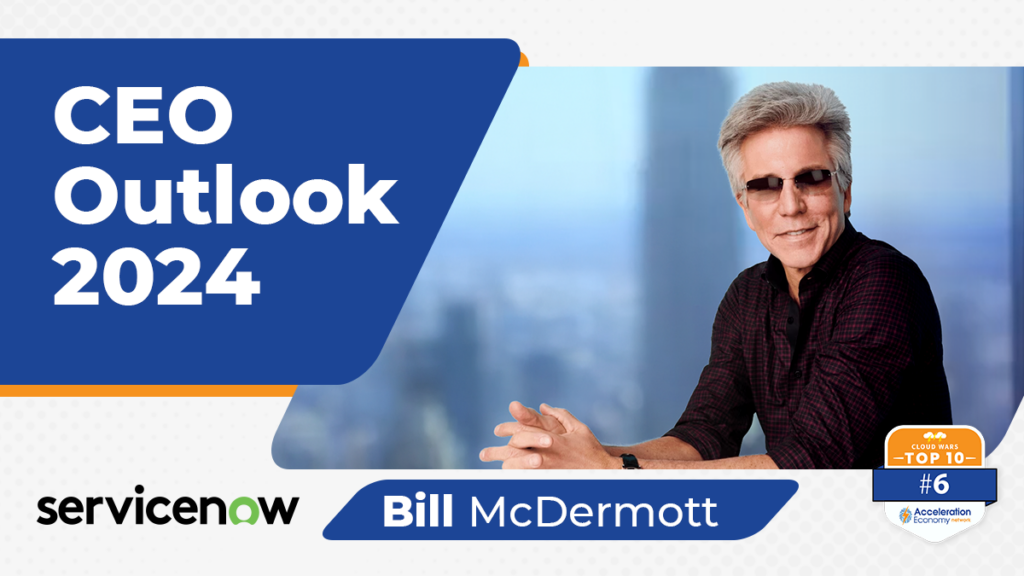
While efficiency and automation are among the many wonderful outcomes GenAI and the cloud can help deliver, the real magic happens when business leaders deploy them to reimagine their companies’ futures and to reset their beliefs about what is possible and what is impossible, says ServiceNow CEO Bill McDermott.
In a recent exclusive interview, McDermott shared in his typically optimistic and energetic style his perspectives on the huge opportunities that lie ahead as well as the dire consequences that will surely rise up for organizations that choose not to eagerly embrace the customer-driven digital future. (You can see the full video interview here.)
Since taking over as ServiceNow CEO more than four years ago, McDermott has radically overhauled the company’s market position and value proposition from one with a vital but fairly narrow focus within IT departments to a modern platform for end-to-end transformation. And the company’s rapid growth and high-level strategic engagements with many of the world’s largest corporations provide the evidence: In Q4, revenue was up 25.5% to $2.37 billion as ServiceNow’s market cap has soared to $162 billion.
That performance, McDermott said, is a direct result of CEOs recognizing that the game has shifted from viewing IT as levers for cost-control and efficiency to seeing it as the key for rebuilding their organizations with the customer at the center of everything.
“CEOs today have really come to understand that modern technology is the most important thing that they have to get right,” McDermott said on a recent Zoom call for this CEO Outlook 2024 episode. (You can see the full video interview here.)
“And what accelerated that in the customer’s mind is the AI revolution. Because now everything is up for grabs — and if you don’t transform digitally, and you don’t prepare your company for the AI revolution to give people back some of their time so they’re not doing soul-crushing work — computers can do that soul-crushing work so people don’t have to — and if you’re not accommodating your customers to meet them where they are in every channel, and if you’re not doing business with a level of simplicity and precision that inspires them to buy from you, you’re going to lose.”
That’s a fairly blunt assessment — but it’s also undeniably true. And McDermott believes that since the overwhelming majority of corporations and other big organizations still have IT environments that are primarily on-premises, ServiceNow can provide highly differentiated value by helping customers retrofit their existing investments for the new world while simultaneously giving them superb AI tools for creating their digital futures.
“If you’re a CEO today, you’re trying to digitally transform with new technology, or you’re trying to give your employees an unbelievable experience so they’re inspired to work for your company, or you’re trying to give your customers a relationship where in any channel you can serve them and you do so beautifully,” McDermott said.
“And if you think about creators and the idea of net-new innovation, you see that all companies to some extent have to be software companies. And CEOs know this. And some companies I walk into — depending on the industry — they actually have more engineers than I do, and they’re not even in the software business!
“But most of the time what those engineers are doing is they’re putting out fires and they’re taking care of things that were built in the 20th century as opposed to building net-new applications and net-new innovations for a new generation,” McDermott said.
“But the ServiceNow Platform enables them to accommodate that 50-year-old architecture that most companies have so now they can build, they can innovate, and they can grow again. And all of this is on one platform with one architecture and one data model — so there’s no tech debt.
“And that’s why they love us.”
Yes, it’s good to be loved. And that affection is the direct result of McDermott driving a vision across ServiceNow of pretty much eliminating the need for customers to have to undertake the dreaded and high-risk “rip and replace” melodrama and instead enable those customers to build on and complement their legacy systems.
“Our customers have the idea of building net-new applications, new ideas, new innovations, new breakthroughs, to serve your customers, serve your employees, inspire your ecosystem, reinvent a supply chain, make better financial applications, whatever the case may be — and now, they can do that,” McDermott said.
“But what you’re doing on ServiceNow still integrates seamlessly into those systems that you spent millions of dollars — and in some cases billions — building. So we maintain the old world, because you’re not going to rip and replace it, but we also give you a clean-sheet design on a bright new future where you can grow again. And I think that is an amazing opportunity for customers.”
As a result, McDermott said, ServiceNow customers are becoming attuned to focusing much more on how to use the cloud and AI to grow and innovate rather than hoping to avoid an IT disaster for another year.
“So now,” McDermott said, smiling and rubbing his hands together, “we go into our meetings with the C-suite knowing that the big question is going to be, ‘Okay, what are we working on today?’ ” (Watch the full discussion here.)
Huge Disruptive Deal with Visa
As those types of forward-looking and business-oriented conversations become the norm, the very nature of the old “buyer-seller” relationship between tech vendor and customer begins to change into one of co-creation, with the tech vendor supplying vital technology expertise and the customer offering up specialized tech insights plus very deep domain expertise.
As that happens, customers frequently evolve to also become partners–and McDermott described this evolution as “a template for ecosystem expansion.” And a perfect example of that is the recent five-year deal involving ServiceNow and Visa to transform the entire payment-services business.
“If you think about generative AI as a solution for end-to-end resolution [of payment conflicts], from the first indication of a questionable charge — and that could have been a misappropriation of somebody’s funds, it could be a stolen card, which we’re all susceptible to, it could be somebody’s data, and then security — how do you clean that up in a consumer-friendly and highly efficient and automated way?
“And to do that for a great brand like Visa, it just shows you the Visa vision — they get it,” McDermott said about the need for companies to first imagine and then build their digital futures.
McDermott then made the leap to what I believe was one of the most compelling parts of a very lively and provocative conversation: Businesses are looking at the Cloud Wars Top 10 not just as makers of tech stuff those businesses buy, but as strategic long-term partners whose collaboration will in large part shape and define the future of those businesses.
“But it’s also a precursor to what other large companies are thinking about. They’re saying, ‘Hey, how do we do what Visa’s doing? Why is Visa having all the fun?’,” McDermott said with a laugh.
“And so what you’re going to see now is a template for ecosystem expansion, where great brands and great companies are going to think about platforms like ServiceNow as a strategic weapon to advance their customer service orientation.”
Think about that for a second: Are there any industries that do not want to improve their customer-service orientation? This is, I believe, the key reason why ServiceNow has achieved its high-flyer status: It’s not only providing customers with tech solutions for today, but with business innovation and vision for tomorrow. And it extends beyond customer service to all of the wide-ranging portfolios of workflow solutions offered by ServiceNow.
“Service management is a huge TAM, but it can also be about how do leaders and companies inspire their employees? Or how do they engage their ecosystem? Or how they rethink supply chains on the fly?
“All of these things,” McDermott said, “are happening in real time.”
Ask Cloud Wars AI Agent about this analysis
Final Thoughts
As befits his position, his personality, and his track record, Bill McDermott deals in big ideas and big opportunities. So what some tech companies refer to as “employee churn,” he describes as “net-present value of highly inspired employees.” That’s not just a clever use of cuddly words — that’s an expression of a vision that transcends efficiency and leaps into the world of doing things that we didn’t believe were feasible or doable or maybe even possible.
“That’s where all the fun is!” McDermott said about his belief in the importance of dreams because “hidden inside people’s dreams is also their destiny.”
“Take a great company like Siemens. They’re looking at their whole employee base and how they can use the ServiceNow platform, powered by GenAI, to give their employees a great experience. Think about the net-present value of a highly inspired, motivated, satisfied employee, and about cutting down churn, the cycle of rehiring and onboarding, and that vicious cycle of again and again and getting stuck on a treadmill.
“You don’t need to be stuck on that treadmill — you can make that go away! Tha’s a new idea. And that can also be true for a call center and rethinking how it works.
“But also, I’ve had some people say to me, ‘Hey Bill, if you’re going to do all these great things with Gen AI, it’s going to crush jobs.’ And I remind them of the Time magazine article in 1966 that basically said that computers would destroy jobs, and that 90% of all jobs would go away, and only 10% would be left and those would be the executive suite. So the states would have to subsidize the people so they could have a nice life,” he said in recalling that fantasy.
“But today, 90 million new jobs later, that obviously isn’t the case. So I say, ‘People, why are you always picking on the poor call-center agents saying AI is going to harm them, when they turn over 35 or 40% a year?’
“Might it be possible that instead of leaving, they might actually like their job because the computer gets to do the soul-crushing work and those people actually get to interact on a human level in a much more advantageous and positive way with customers?
“Wouldn’t that be nice?”

Register for Acceleration Economy’s Cloud Wars CEO Outlook 2024 Course, now available. Featuring exclusive interviews on strategy, AI, and customers with the CEOs of Cloud Wars Top 10 companies.










